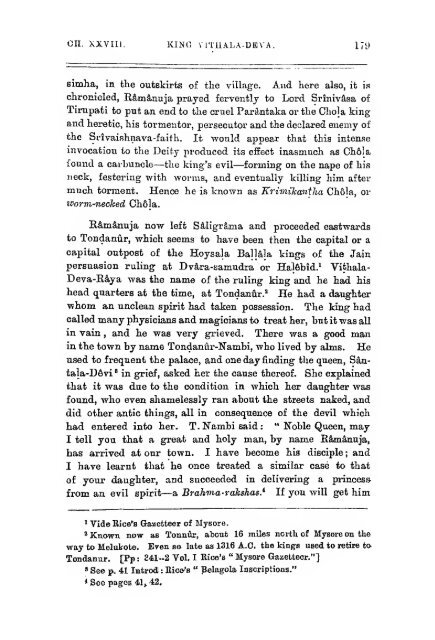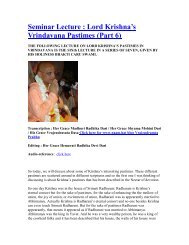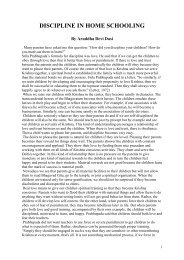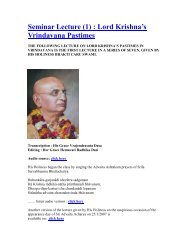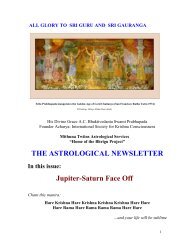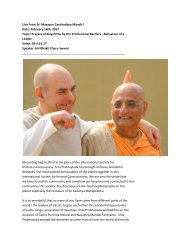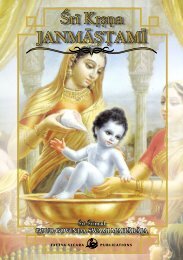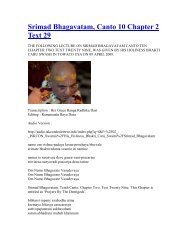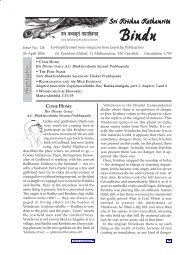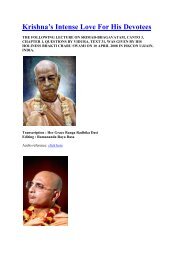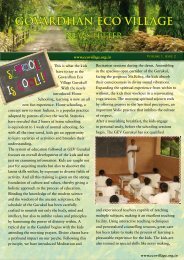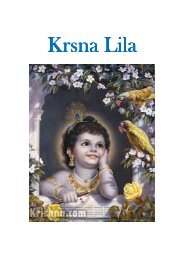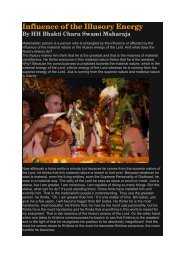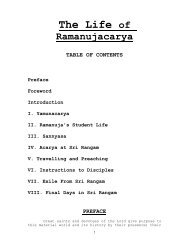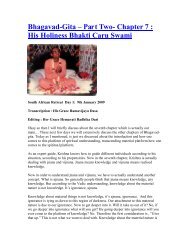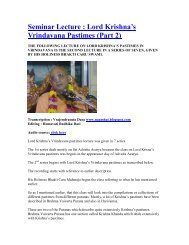the exponent of the Visishtadvaita philosophy - ebooks - ISKCON ...
the exponent of the Visishtadvaita philosophy - ebooks - ISKCON ...
the exponent of the Visishtadvaita philosophy - ebooks - ISKCON ...
Create successful ePaper yourself
Turn your PDF publications into a flip-book with our unique Google optimized e-Paper software.
oil. XXVni. KING VITIIALA-DEVA. 179<br />
simha, in <strong>the</strong> outskirts <strong>of</strong> <strong>the</strong> village. And here also, it is<br />
chronicled, IiS,m§,nuja prayed fervently to Lord SrinivS,sa <strong>of</strong><br />
Tirupati to put an end to <strong>the</strong> cruel Parintaka or <strong>the</strong> Chola king<br />
and heretic, his tormentor, persecutor and <strong>the</strong> declared enemy <strong>of</strong><br />
<strong>the</strong> Srivaishnava-faith. It would appear that this intense<br />
invocation to <strong>the</strong> Doity produced its efEect<br />
inasmuch as Ch6la<br />
found a carbuncle—<strong>the</strong> Icing's evil—forming on <strong>the</strong> nape <strong>of</strong> his<br />
neck, festering with worms, and eventually killing him after<br />
much torment. Hence he is known as Krimihantha ChSla, or<br />
v!07-m-necked Ch6]a.<br />
R&m&nuja now left Sfijligrebma and proceeded eastwards<br />
to Tondanur, which seems to<br />
have been <strong>the</strong>n <strong>the</strong> capital or a<br />
capital outpost <strong>of</strong> <strong>the</strong> Hoysala Ballala kings <strong>of</strong> <strong>the</strong> Jain<br />
persuasion ruling at Dvsbra-samudra or HalSbid.^ Vithala-<br />
Deva-Raya was <strong>the</strong> name <strong>of</strong> <strong>the</strong> ruling king and he had his<br />
head quarters at <strong>the</strong> time, at Tondanur." He had a daughter<br />
whom an unclean spirit had taken possession. The king had<br />
called many physicians and magicians to treat her, but it was all<br />
in vain , and he was very grieved. There v/as a good man<br />
in <strong>the</strong> town by name Tondanur-Nambi, who lived by alms. He<br />
used to frequent <strong>the</strong> palace, and one day finding <strong>the</strong> queen, SS,nta|a-D6vi<br />
° in grief, asked her <strong>the</strong> cause <strong>the</strong>re<strong>of</strong>. She explained<br />
that it was due to <strong>the</strong> condition in which her daughter was<br />
found, who even shamelessly ran about <strong>the</strong> streets naked, and<br />
did o<strong>the</strong>r antic things, all in consequence <strong>of</strong> <strong>the</strong> devil which<br />
had entered into her. T. Nambi said :<br />
" Noble Queen, may<br />
I tell you that a great and holy man, by name Sdmslnuja,<br />
has arrived at our town. I have become his disciple ; and<br />
I have learnt that he once treated a similar case to that<br />
<strong>of</strong> your daughter, and succeeded in delivering a princess<br />
from an evil spirit—a Brahma-rakshas.^ If you will get him<br />
' Vide Rice's Gazetteer <strong>of</strong> Mysore.<br />
^ Known now as Tonnur, about 16 miles north, <strong>of</strong> Mysore on <strong>the</strong><br />
way to Melukote. Even so late as 1316 A.O. <strong>the</strong> kings used to retire ta<br />
Tondanur. [Pp : 241-2 Vol. I Rice's " Mysore Gazetteer."]<br />
' See p. 41 Introdi : Eic&'s " Belagola Inscriptions."<br />
* See pages 41, 42.


